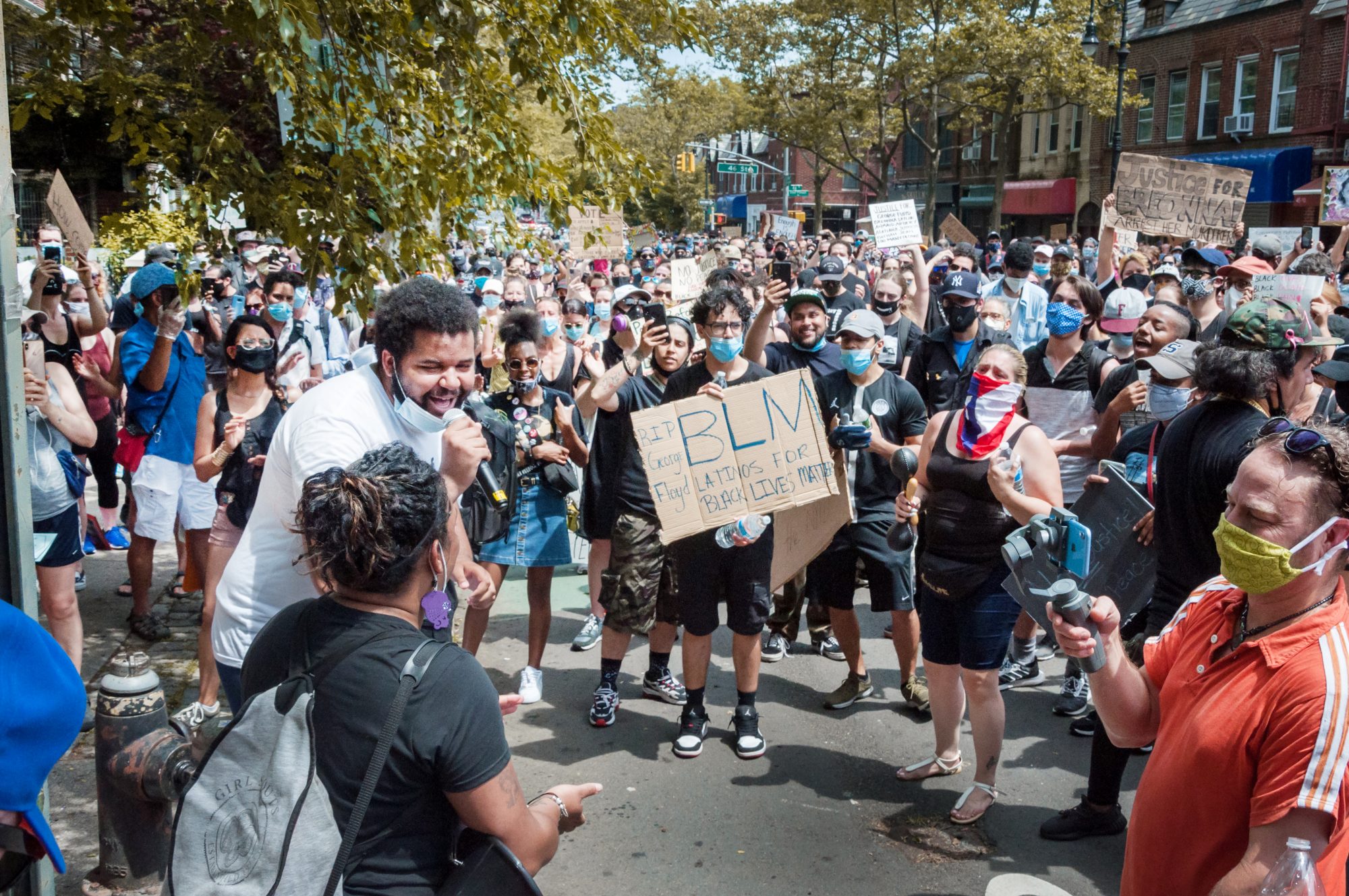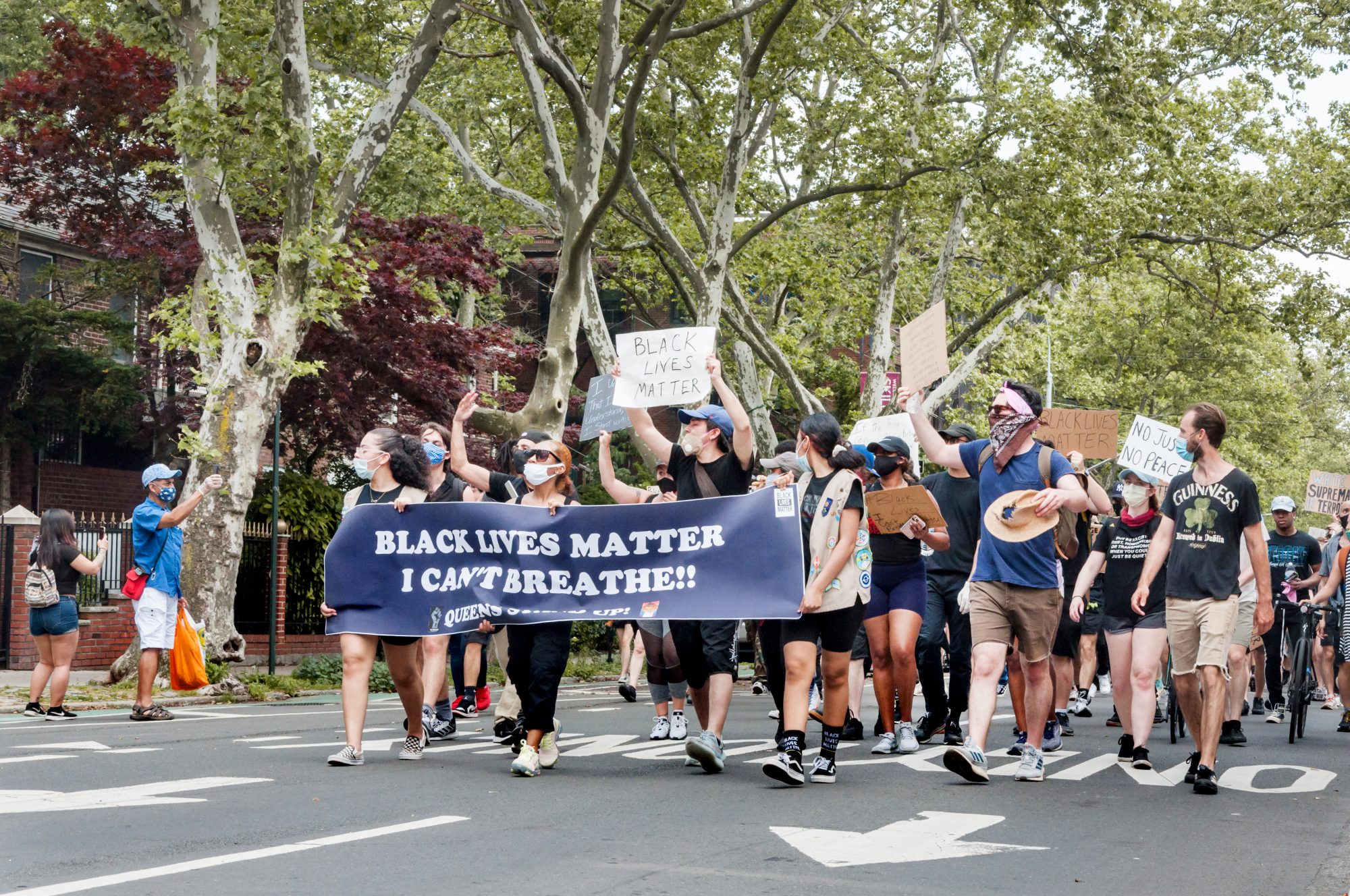
As Pride Month began, many of my friends with racial minority and LGBTQ teens felt a collective shudder. This time last year was a joyous celebration of tolerance. It is now a minefield of seemingly impossible choices. Many Pride Month marches—such as New York's legendary Pride parade—have been canceled due to the COVID-19 pandemic. Then there is concern around police violence at the protests supporting the Black Lives Matter movement.
We feel pride for the thousands of young people of all races and ethnicities marching for social justice, but we also feel a tangible fear. Will our city be "normal" again? Will things truly be better for our teens when they are adults, or will the instructions "Keep your hoodie down, no hands in your pockets, carry your school ID, walk the other way slowly if you see police cars on the corner" be passed on to the next generation?
As the world as we knew it seems to slip away and remake itself before our eyes, the questions are endless and exhausting. If I let my multiracial 16-year-old son participate in Pride Month activities, am I exposing him to the coronavirus? What about the potential for him to end up in the middle of violent counter-protests? Does the color of my child's skin make him more vulnerable to violent confrontation than other teens?
It's important to remember that it is not illegal to protest and demonstrate, as long as it is done peacefully. But even if your teen has the best intentions, they have no control over anybody else but themselves and may be connected to the wrong crowd by police just through proximity, says Kiaundra Jackson, LMFT, a therapist in Los Angeles.
"If your child is a person of color, I assume you have had a conversation with them about what it is like to be Black in America and go into situations where they could be apprehended or arrested," says Jackson. "Even if your teen has the right intentions, they can only control their own actions and can be clumped into a group they don't want to be in by proximity. Parents need to be prepared that their teens could be jailed, pepper-sprayed, or shot at with rubber bullets just because they are there."

As you let your children express their First Amendment rights, it's important to discuss potential risks and prepare them with safety practices as they head into peaceful demonstrations and rallies. Here are some rules to follow as a family to keep everyone safe.
1. \”Read\” the Block
For urban teens, it may be easier to find a large Pride march to blend into. However, there is not always safety in numbers. Monitor social media and citizen alert apps for reports of unrest, mass arrests, or other disturbances and avoid those areas. Insist that your teen practices social distancing and avoid areas where many demonstrators are not wearing masks.
Remind your child to keep a safe distance from all groups that are congregating in narrow or confined spaces. Help them understand that while remaining socially distant, they should account for the possibility of aggressive crowd control methods by authorities.
Teens in less densely populated areas should avoid isolated areas or marching where a quick exit to public transportation is not possible.
2. Be Wary of Curfew Hours
In some cities, curfew hours may begin with little warning, and public transportation and even certain main roads may become inaccessible much earlier. While curfews in different cities may be enforced differently, it important to note that a curfew time denotes the hour that you must be home, not just leaving the demonstration. That means the safest spot—and the extent of your teen's evening movements—should be within a few minutes' walk from public transit or their parked car.
If your teen and their friends are taking a cab or a ride-share, ensure that they have scheduled the ride well ahead of time and allowed for extra traffic.
3. Have a Plan and a Phone
Even if you're met with a chorus of groans, make sure your teens can be tracked at all times. Install a family locator app on your phone and your child's so that you can be aware of their movements (even if you are there with them), and make sure they have an external travel charger with them.
If your teen is heading to a protest or demonstration with their friends, make sure they have a meeting place planned ahead of time if they get split up. Double-check that they have contact information for the friends they will be with before they leave home. It could be a good idea to write these phone numbers down on a piece of paper they carry in their wallet in case their phone does die or gets lost or broken. To try to prevent this, purchase a brightly colored phone case if your child's phone is a dark color so it is easy to spot if dropped.
4. Prepare for Police Conflict
Even peaceful demonstrations can call for extended police coverage, so you should prepare your teen to expect to see a lot of police in full riot gear.
"If your teen does get apprehended by police, tell them to not make sudden movements—reaching into their pockets or getting something from their purse can be seen as a threat to police officers and that can result in something that could be fatal," says Jackson. "Tell your teen to make sure their hands are where they can be seen. That is why we see people in front of the police with their hands up or out."
She adds that teens should be told not to do anything to provoke the police: "The color of your skin may already be a threat to other people so you don't want to give them an additional reason to think you have done something wrong."
Since your child will be with someone they trust, make sure that person also has your cell phone number so they can contact you or another family member if something happens, Jackson adds.
5. Plan Ahead for Tear Gas
There have been reports of police using tear gas on peaceful protests across the country, so you should prepare your teen for exposure. Tear gas and pepper spray are heavier than air so they fall toward the ground once they are dispersed. This means children, who are often smaller than the crowds around them, may be more susceptible to signifiant exposures since they are closer to the ground, explains Kelly Johnson-Arbor, M.D., medical toxicologist and co-medical director of the National Capital Poison Center.
"Wearing masks, goggles, and long-sleeved clothes (shirts and pants) can help protect against exposure," says Dr. Johnson-Arbor. "Do not wear contact lenses; wear glasses if you need them, but realize that tear gasses and pepper spray can still get into your eyes from around the sides of eye glasses."
She also suggests explaining to your teen that tear gas is packaged along with a propellant and detonating agent. "These can cause serious traumatic injuries if the tear gas canister is picked up, kicked, or thrown," she adds. "Do not attempt to pick up, kick, or throw a tear gas canister that has already been launched by police; you could injure yourself or someone else."
If your child or teen is exposed to tear gas, tell them not to rub their eyes as it can lead to further irritation. They should immediately get out of the area of exposure and wash out their eyes with plain water. "For irritation of the eyes and skin, there are many remedies listed online (including milk, baking soda, and baby shampoo), but nothing has been proven to work better than plain water," says Dr. Johnson-Arbor. "If you have access to a shower, it may be easiest to just stand under the running shower water for 20-30 minutes or until the irritation subsides."
The effects of tear gas should only last for minutes to half an hour at most, but Dr. Johnson-Arbor says that if you're in pain for 30-60 minutes, seek medical attention right away. Your teen should save the phone number for poison control in case of an emergency: 800-222-1222.
6. Understand Today\’s Special Health Risks
Even in communities that have flattened the curve and reopened completely, the risk of transmission of the coronavirus remains. It is easy to become overwhelmed with emotions when in an energized crowd, but remind your teen that part of caring for our communities is promoting public health. Help your teen stay safe by packing extra masks, gloves, and sanitizer for friends, as well as easily packable first aid supplies like bandages and disinfectant wipes.
7. Learn about the Special Pressures LGBTQ Teens of Color Face
Not only are Black, Indigenous, and mixed-race teens faced with daily reminders of social, political, and economic uncertainty, but for many LGBTQ teens, having Pride Month canceled because of the coronavirus is a heavy burden to carry. Remember that even as many positive changes occur across the country, adolescents are grappling with puberty, impending adulthood, and their place in history—all at once. That's a perfect storm of internal and environmental pressure that is all but unimaginable for Gen X parents, like myself, who are struggling to get our heads around the world as adults.
"They are going to be experiencing a lot of heightened emotions—it can be anger, sadness, frustration, or disappointment," says Jackson. "It’s important for the parents to allow their child to feel their feelings and not suppress them or try to change them. Something that was so precious to them, something that allowed them to express how important their sexuality or identity is to them has been stripped away from them due to the pandemic. If I was a parent who was experiencing this, I would let them feel their feelings."
8. Offer Teens a Safe Space to Mourn, Vent, and Celebrate
Even if your teen cannot participate in any public Pride Month activities or demonstrations, it is important to acknowledge the pressure that turbulent times can add to a teen's life. Mental health awareness is essential for your child's well-being.
"Don’t let this moment pass them by," says Jackson. "Make sure that Pride Month is celebrated in some capacity, even in your home. You could do something in your home like creating graphics and flyers you could put in your window or front lawn to let others know you are celebrating. Talk to that child who is missing out and ask 'what we can do here, locally at home, to honor you, to respect you, to give homage to this month' and see what they say. Allow them to be the initiator of how they want things to go."
9. Share Mental Health Tools and Resources
There are many resources available to help your teen if they are struggling through this time. The Trevor Project is an organization that offers 24/7 support via phone, email, and chat for LGBTQ teens and their families. They offer referrals to local resources and an immediate listening ear for teens who are experiencing mental health issues or who just want to talk to an ally. The TrevorLifeline is 1-866-488-7386.
The Bottom Line
These past few weeks represented a once in a lifetime sea of changes in American history. We feel different as Americans. We are talking openly about the imbalances and the harm we have caused and we have suffered. It is beautiful and inspiring, but our optimism is laced with anxiety.
I can't do anything about the uncertainty of the world around me. But I can be my child's refuge, ally, and best friend. As we honor America's diversity and empower our children to make their voices heard, we are creating change. That is a potent anecdote to despair. That is pride.
Additional reporting by Melissa Bykofsky.
